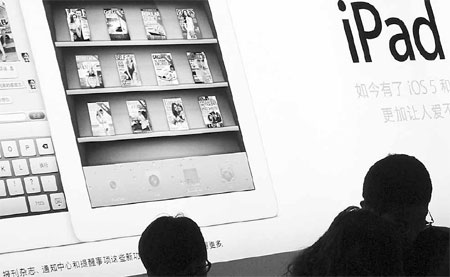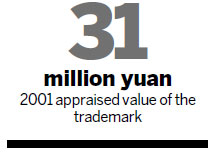|

An Apple store in Beijing. The electronics giant reached a settlement on rights to the iPad trademark, but now faces a suit over its Snow Leopard operating system. Wu Changqing / China Daily
|

Just after it settled a long-running dispute over rights to the iPad name in China, Apple Inc is facing another trademark conflict, this time with a Jiangsu company that alleges Apple's Snow Leopard operating system violates its existing trademark.
A Shanghai court will begin hearing the case on July 10.
Jiangsu Snow Leopard Household Chemical Co Ltd originally specialized in toothpaste and cosmetics, but later expanded to many other fields including electronics, advertising and medical equipment.
It has since registered 42 Snow Leopard trademarks in various categories. In 2008, its toothpaste was granted well-known trademark status in China.
In 2000, the company registered the Snow Leopard trademark for household electrical appliances and software, a category that includes touch-screen computers and printing software.
Apple applied for the Snow Leopard trademark for computer software in 2008, but the application was rejected, according to a database managed by the State Administration of Industry and Commerce.
In 2009, Apple announced the release of its operating system Mac OS X v10.6 with the name Snow Leopard.
Tong Yu, chairman of the Jiangsu company, said Apple's application was rejected because his company already registered the same trademark in the same category.
"Apple has been deliberately infringing on our trademark rights - it should have noticed that its application was rejected," he said.
Tong added that the name snow leopard itself has become famous in recent years after the Chinese Snow Leopard Commando Unit patrolled the 2008 Olympic Games.
A TV drama with the same name is enjoying increasing popularity among Chinese viewers.
"Apple probably chose that name to call its operating system because it realized the name's reputation and great influence," he said.
The chairman noted that the trademark Snow Leopard was worth 31 million yuan ($4.9 million) in 2001, according to evaluation by Jiangsu Zhongtian Asset Appraisal Office, and is now worth 420 million yuan after another decade of development.
The lawsuit, which includes Apple and four retailers, asks for 500,000 yuan in compensation.
The suit alleges the defendants have been using both Chinese and English names for the Snow Leopard operating system without its authorization.
Jiang Wei, an attorney for the Jiangsu Snow Leopard, said the company has submitted 104 items of evidence to the court.
But Wang Hongyu, director of the Jiangsu Honrun Law Firm, said legalities may not favor the Chinese company.
The trademark that the company registered for electronics products and software is in the Chinese language for Snow Leopard, but Apple is using only the English name on its official website to promote the operating system, Wang explained.
But retailers might have more legal exposure, he said.
"If the evidence proves they have used the Chinese name for Snow Leopard in their shops when selling Apple's operating system, then it's infringement on the Jiangsu company's trademark," said Wang.
Prolonged dispute
The latest suit follows a negotiated settlement mediated by the Guangdong Higher People's Court between Apple and debt-laden Chinese computer display maker Shenzhen Proview Technology that ended a two-year battle over the rights to its iconic iPad trademark.
According to the settlement that took effect on June 25, Apple paid $60 million to acquire the full trademark for iPad on the Chinese mainland.
Although the amount is far lower than $500 million that Proview sought, industry insiders believe that it is a fair price.
"The settlement is a win-win result," said Zhao Hu, chief lawyer at Beijing H&J Law Firm's IP division. "Apple should be willing to accept this price because it would earn much more in the future. And Proview can ask for this high price because the defendant side is Apple."
You Yunting, a partner at the DeBund Law Office, noted that "multinational companies must realize that the legal system and common business practices are different in China".
"They may also expect higher costs in China in the future, as this case shows that an acquisition can only be achieved after thorough examination.
"If Apple waited a little bit later to let its intellectual property team have enough time to purchase the trademark for the Chinese mainland, it would probably not have to pay the $60 million compensation today," he said.
Randall Rader, chief judge of the US Federal Circuit Court of Appeals, told China Daily that the case "reminds all companies that the most important thing is to always obey the rules, although the rules might be different in different places".
zhangzhao@chinadaily.com.cn
(China Daily 07/04/2012 page17)


